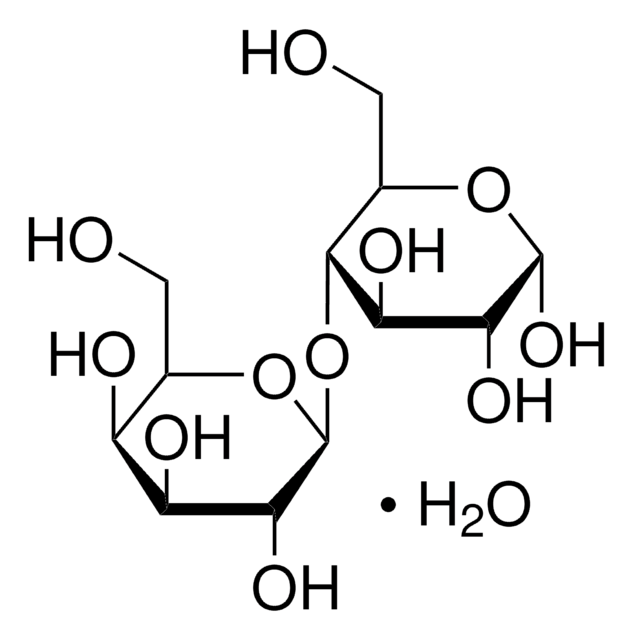G0625
D-(+)-Galactose
≥98% (HPLC)
Synonym(s):
Galactose
About This Item
Recommended Products
biological source
bovine (Ruminant- Cow, Ox, Buffalo)
Quality Level
assay
≥98% (HPLC)
form
powder
technique(s)
HPLC: suitable
cell based assay: suitable
color
white to off-white
useful pH range
5.0-7 (25 °C, 180 g/L)
mp
168-170 °C (lit.)
solubility
water: 180 g/L at 20 °C (68 °F )
application(s)
cell analysis
genomic analysis
life science and biopharma
storage temp.
room temp
SMILES string
OC[C@@H](O)[C@H](O)[C@H](O)[C@@H](O)C=O
InChI
1S/C6H12O6/c7-1-3(9)5(11)6(12)4(10)2-8/h1,3-6,8-12H,2H2/t3-,4+,5+,6-/m0/s1
InChI key
GZCGUPFRVQAUEE-KCDKBNATSA-N
Looking for similar products? Visit Product Comparison Guide
General description
Furthermore, galactose is a fundamental component of the disaccharide lactose and is released through hydrolysis by β-galactosidase enzymes, playing a vital role in the survival and virulence of bacteria. In Escherichia coli, galactose is utilized through the Leloir pathway, with β-d-galactose serving as a carbon source and β-d-galactose inducing UDP-galactose synthesis for biosynthetic glycosylation. Galactose finds applications in researching metabolic disorders like galactosemia and serves as a substrate for enzymes involved in galactose catabolism, making it a valuable component in galactosyltransferase labeling buffer and a supplement in MRS broth for the growth of thermophilic lactobacilli.
Application
- as a supplement in SGal media to grow yeast strains to examine the role of different Ssa heat-shock proteins (Hsp70) isoforms in Hsp90 chaperoning functions
- as a carbon source in Biolog (MT2) microplate assay to test the ability of isolates to utilize carbon substrates
- to induce expression of membrane protein-green fluorescent protein (GFP) fusion in yeast
Biochem/physiol Actions
Features and Benefits
- Ideal for Metabolomics, Biochemical and Cell Biology research
- Versatile and adaptable for wide variety of laboratory and research applications
Other Notes
Storage Class
11 - Combustible Solids
wgk_germany
WGK 3
flash_point_f
Not applicable
flash_point_c
Not applicable
ppe
Eyeshields, Gloves, type N95 (US)
Choose from one of the most recent versions:
Already Own This Product?
Find documentation for the products that you have recently purchased in the Document Library.
Customers Also Viewed
Our team of scientists has experience in all areas of research including Life Science, Material Science, Chemical Synthesis, Chromatography, Analytical and many others.
Contact Technical Service








